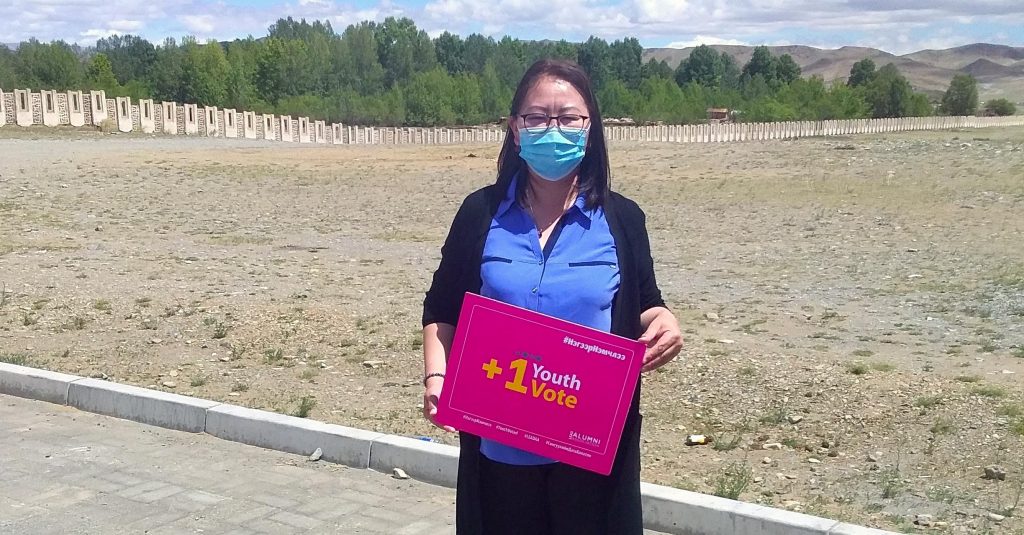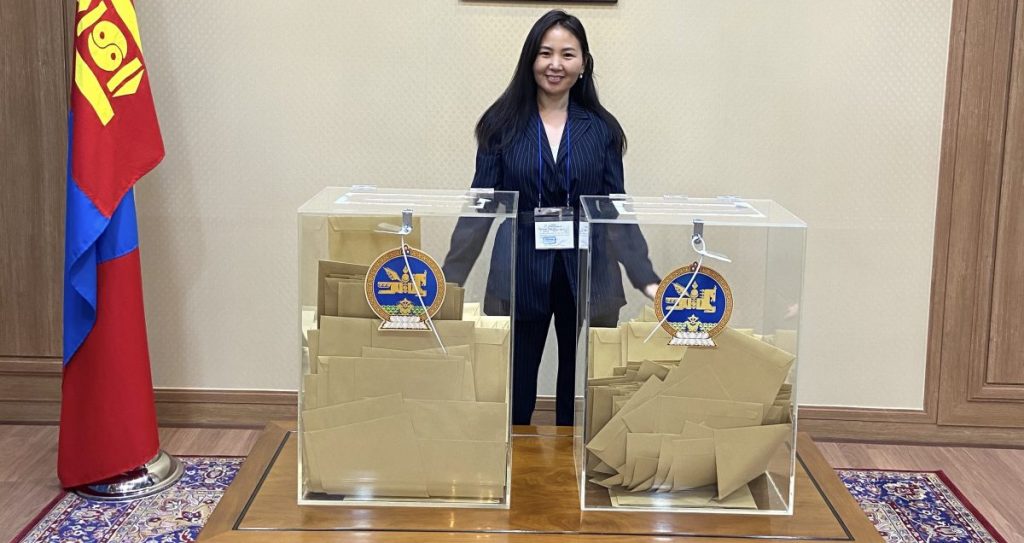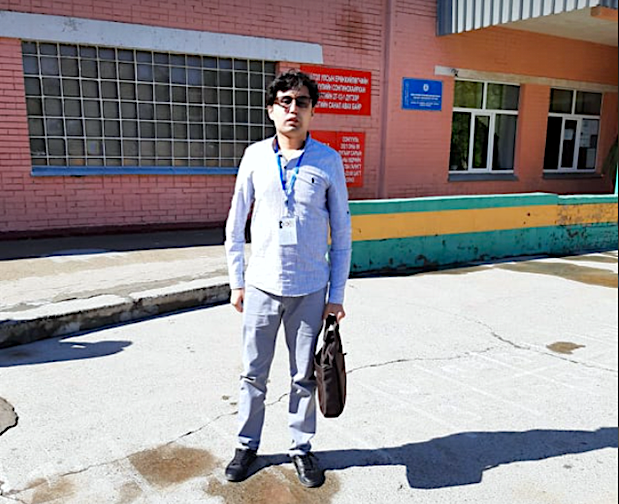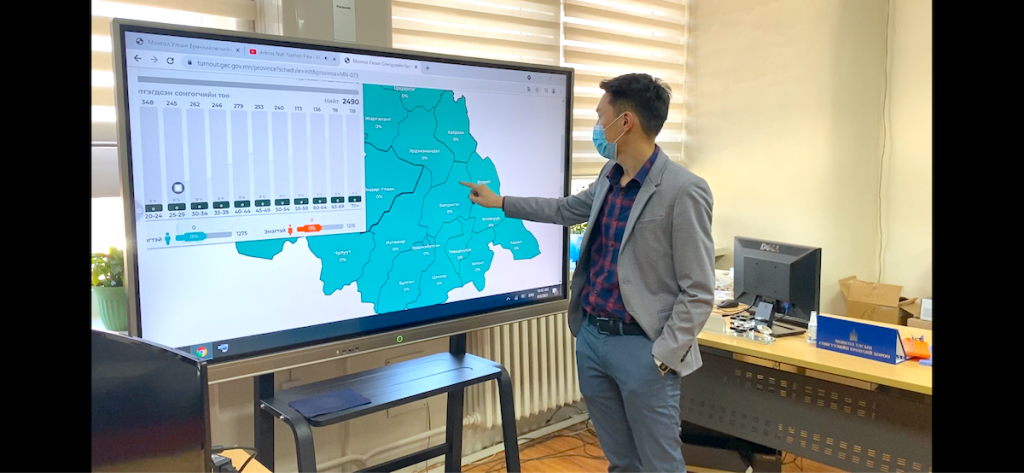-
What We Do
- WHERE WE WORK
-
About Us
 Welcome Message from Carol Jenkins
Welcome Message from Carol JenkinsFor more than 90 years, World Learning has equipped individuals and institutions to address the world’s most pressing problems. We believe that, working together with our partners, we can change this world for the better.
On my travels, I’ve had the opportunity to meet with many of those who have joined us in this mission. In Baghdad, we’ve trained more than 2,300 Iraqi youth who are already giving back at home. In London, our partners in the TAAP Initiative strongly believe that we are all responsible to practice inclusion. And in Vermont, our Experiment in International Living and School for International Training participants prove every day that they have the tools and the determination to change the world.
Please join us in our pursuit of a more peaceful and just world.
- Get Involved
Media Center > Story
Six LEAD Mongolia Alumni Share Their Presidential Election Experiences
July 22, 2021

By Meghan Burland, Chief of Party, Leaders Advancing Democracy (LEAD) Mongolia
Mongolia’s June 9 presidential elections marked the country’s third round of voting in 13 months. While voter turnout was historically low, likely due to an increase in COVID-19 cases in the days preceding the election, 59 percent of eligible voters came out to elect former Prime Minister U. Khurelsukh from the Mongolian People’s Party to a six-year term as president.
As with the previous parliamentary and local elections, alumni from the USAID-funded Leaders Advancing Democracy (LEAD) program used their training to support the election process by serving as civil society observers, volunteering at polling stations, and recording voter turnout in real-time.
Observing Elections
As civil society election observers, LEAD alumni helped safeguard the integrity of the presidential vote. Ganzorig Tsedenbal, a 2018 U.S. Exchange Program Fellow, observed the election in Ulaanbaatar as part of a civil society monitoring effort organized by Youth Policy Watch, a local NGO. At his polling station, the process went smoothly, with observers from the three political parties joining the civil society effort, sharing information and ideas. By volunteering as a civil society observer, Ganzorig says he wanted to play a role in ensuring a fair election and felt confident and useful in helping to “prevent any possible violations or fraud.”
Another 2018 U.S. Exchange Program Fellow, Altanchimeg Purevsuren, also observed the election as part of Youth Policy Watch’s effort. However, her observation came with a twist — currently living in Seoul, she observed Mongolians residing in South Korea voting at the embassy in the capital. Having previously worked at Mongolia’s General Election Commission (GEC) for more than seven years, Altanchimeg has substantial experience in elections work, but this was her first time participating on behalf of civil society.
Altanchimeg observed voting at the embassy in Seoul over two days and says there was an exciting atmosphere at the embassy, with voters wearing traditional clothes, bringing their families, and taking photos in front of the embassy and the Mongolian flag.

“When voters are coming to the embassy polling station, it is so meaningful for them,” she says. “They were proud of their participation in the election.”
Shirnen Zorigt, a 2020 In-Country Program Fellow, took a different approach by joining a volunteer team to monitor the election for accessibility for people with disabilities and develop recommendations to make voting more accessible in the future. This effort was organized by the Parent Teacher Association of Mongolia (PTAM) and included nongovernmental organizations supporting disability rights, people with disabilities, and other citizens.
As a visually impaired voter, Shirnen went into the observation process well aware of the challenges people with disabilities may face when voting. His goal in participating was to shine a light on these issues and provide realistic proposals for ways government agencies could address these barriers to participation. Shirnen, Ganzorig, and Altanchimeg all note that their LEAD training helped them take a human rights approach in the observation process and focus on inclusion in the elections, especially for women, people with disabilities, and youth.
“If we strive for a democratic and equal society, its most valuable thing must be people,” Shirnen says. “The right to vote and to be elected is the most important thing in the society we are aiming to build right now.”

For this election, the GEC improved voter education efforts for deaf and visually impaired voters, providing information on voter rights and the election process in accessible formats. In cooperation with the GEC, PTAM also organized trainings on the rights of voters with disabilities for polling station staff nationwide. However, some shortcomings remained, including that political parties did not provide enough accessible information for voters with disabilities and many polling stations were not fully accessible.
Overall, Shirnen says it was a “great step forward” to have a team of voters with disabilities involved in election observation and providing recommendations, as well as having accessibility trainings for polling station staff.
Tracking Voter Turnout
Other alumni contributed to the election by working directly with the GEC to improve the effectiveness and transparency of voter turnout data. Ganchimeg Namsrai, a 2017 In-Country Program Fellow, and Sanjaasuren Munkhbat, a 2018 U.S. Exchange Program Fellow, were part of a team from the LEAD Alumni Association that received support from World Learning and the GEC to implement the “Making Elections Effective and Transparent” (MEET) project.

The project aimed to develop and utilize a comprehensive online platform to track voter turnout and share that information transparently with the public. In previous elections, the GEC released voter turnout four times during the day, with a two-to-three-hour lag. This information was collected via telephone from every polling station nationwide and announced at a press conference. Citizens were not able to access voter turnout data on their own.
To address these issues, the team created a mobile application that integrated data from every election station with internet access; those stations without internet access would provide their data by calling in at set times during the day. The integrated data was displayed on a web platform, where citizens could access the information on any device with internet access. The voter data was disaggregated by location, gender, and age, in contrast to previous elections. As a result of the MEET project, this year the GEC released election turnout data to the public on an hourly basis, with 90–95% accuracy. The LEAD Alumni Association has turned over the platform to the GEC to use in future elections, which will allow for additional analysis of voter turnout and trends.
The data from this year’s election revealed that young people, particularly those between 20 and 30 years old, had the lowest turnout (43.72% for voters aged 20–24 and 46.32% for those aged 25–29). As a young country, the low turnout of youth voters on June 9 indicates that young people need to be more actively involved in future elections to drive change. Ganchimeg believes the government and civil society should work together to develop research-based policies and plans specifically to improve youth participation.
“The active participation of young people in elections is an indisputable basis for their input into public policy and, in turn, for accountability of the elected officials,” she says.
Ganchimeg, as team leader, also notes how important it was to have support from government agencies like the GEC and the General Authority for State Registration to successfully implement the project.
“Working with government agencies as a representative of civil society has been a new experience and success for me,” she says. “I also understood the importance of cooperation and understanding between stakeholders.”

Sanjaasuren, a data specialist and IT engineer, oversaw and managed the development of the software and technology. While there were some challenges installing the mobile application due to cybersecurity and timing concerns, he says the project was worth it because it offered transparent access to turnout data, which can now be analyzed and used to improve voter participation during elections.
“I think there is no way to solve a problem without revealing it,” Sanjaasuren says, later adding, “Now we have a wide range of data, and we should find reasons and solutions.”
Volunteering at Polling Stations
On the government side, 2017 In-Country Program Fellow Munkhzul Tsend served as the chairperson of a polling station commission in Bayankhongor aimag (province). In Mongolia, polling station commissions are volunteer groups composed of civil servants that have to pass an examination to work in this capacity. Munkhzul had previously volunteered for this commission seven times, in presidential, parliamentary, and local elections. As the chairperson at her station, Munkhzul was responsible for turning over the election documents properly and ensuring preparations are made within the framework of the law. From her perspective as a polling station volunteer, the election proceeded smoothly, with officials following a pre-approved schedule.
There were additional measures taken this year, including regular disinfection of all polling stations, manual counting of all ballots at every polling station nationwide, and using the new MEET application to submit voter turnout data. Munkzhul was also able to use the MEET application to present voter turnout data at the polling station and noted that it enabled them to record voter turnout data in a timely manner, an improvement from previous elections. She also cites her LEAD program experience in providing her with the tools and techniques to manage and lead her team working in the polling station.
The LEAD program emphasizes the strength of the LEAD network and the importance of working together to achieve a common goal, and this was in evidence during the June 9 election. For example, one of the leaders at Youth Policy Watch is also a LEAD Mongolia alumna, and LEAD alumni have observed in their effort for both the 2020 parliamentary and 2021 presidential elections. Altanchimeg learned of her observation opportunity through the LEAD Mongolia Facebook group. The LEAD Alumni Association had previously worked with the GEC on last year’s elections, setting up a fruitful collaboration that continued this year.
Although LEAD alumni participated in the election in different capacities, all emphasized the importance of voting in a democratic society. Sanjaasuren credited learning the fundamentals of democracy during his LEAD experience as one of the reasons he worked to implement the MEET project despite implementation challenges.
Shirnen summarizes it best—voting “may seem like a right, but…it is a civic duty that everyone must fulfill.”
***********************
LEAD Mongolia is a five-year leadership development program — funded by the U.S. Agency for International Development (USAID) and implemented by World Learning — that brings together young professionals representing different sectors and experiences to take part in civic advocacy and leadership training, exchanges, and community action planning, all aimed at fostering a strong network of young democracy advocates across the country.
This article was made possible through the translation assistance of World Learning Program Officer Munkhkhishig Dashtseren.
The contents of this article are the responsibility of World Learning and do not necessarily reflect the views of USAID or the United States Government.





